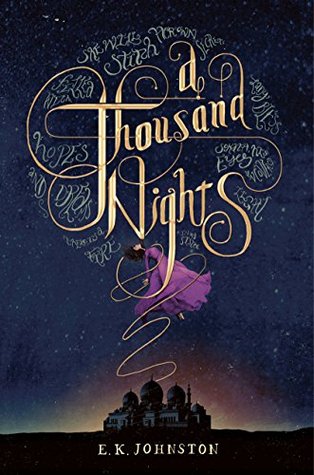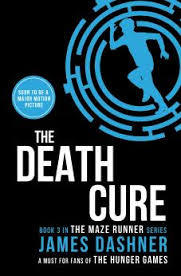
Book Title: A Thousand Nights
Author: E.K. Johnston
Date Started: August 21st 2015
Date Completed: August 25th 2015
Genres: Fantasy, Historical
Quality Rating: Four Stars
Enjoyment Rating: Five Stars
Quality Rating: Four Stars
Enjoyment Rating: Five Stars
Final Rating: Five stars
Review:
◆ Thank you NetGalley for this eBook copy for review ◆
Image Source - https://www.goodreads.com/book/show/25337864-a-thousand-nights
◆ Thank you NetGalley for this eBook copy for review ◆
I was actually very pleasantly surprised by A Thousand Nights. After reading The Wrath and the Dawn not that long ago and being really disappointed, I was ready to get find a typical Young Adult twist a traditional story. But instead I got a fairytale-esque tale and a genuinely brave female protagonist.
The fact that A Thousand Nights doesn't include names apart from Lo-Melkhiin actually worked in its favourite for me. I know other readers have found it confusing to keep up with and seemingly pointless, but for a reader who grew up reading fairytales where there were almost never any named characters it just enhanced the distant magical nature of the world. Having said that, it does become harder to empathise with some of the people a little later on, though I have to say personally that the atmosphere it created was enough to override that drawback.
I do feel that the writing style could have been a little more captivating to really exaggerate the beautiful Arabian setting and the very traditional kind of magic, but the dialogue does make up for a lot of this. Again, I did felt like I was reading something from my childhood when the Skeptics began their talk of albeit simplified philosophy to somehow make sense of the magic surrounding them - but like any good fairytale, their reasoning isn't enough to explain the wondrous fantasy that is actually present.
I loved the traditional style of magic in this book. The way Johnston gradually introduces us the possibility that not everything is how it seems was very well done in my opinion; it gave us time to appreciate the situation the protagonist was in as a person at first, and then brought in the idea that maybe the stakes were higher than we first thought. I have to commend Johnston on her ability to do it naturally and without entirely dominating everything else she had built up to that point - sometimes the problem with fantasy is it gives you too much room for imagination, and can cheat things like danger. But it was a genuine part of the story that eventually ended up slowly building up our heroine as well as the circumstances she was in.
The ending was very good, and I was so happy with it because it was left entirely for our protagonist to be the heroine of her own story. Though I would point out Scheherazade doesn't really gain any proper friends throughout the entire book, and perhaps this could make her story seem slightly less accessible and realistic, it does mean that she is truly the heroine. Sometimes having other characters around - especially with female protagonists - does mean the 'heroes' can end up being sidelined for an unexpected twist at the end.
You also forget how satisfying it actually is to read a stand-alone and get the whole story. Even if we get an ending that isn't perfect for everyone and leaves the characters full of possibilities, we sometimes don't notice how little things get tied up these days. It doesn't matter if someone of the characters lost friends or family, and we don't have to know what they go on to do after that last pages, because we can appreciate what they went through with us there reading - and we can look back on their development in such a short space of time and still have that feeling of achievement.
Though I can't say I connected to any of the characters, I have a feeling this was done quite deliberately. By not providing names or really that much overall aid or significance to the story (bar Scheherazade - who's name is never actually mentioned), we're drawn to her a lot more as a protagonist. The first person helps this, and so it ends up being her own story, and her's alone.
I really liked Scheherazade actually. I wasn't entirely sure at the beginning if it was because she wasn't being overly emotional and the fact she wasn't having a power struggle with all the men around her, as we often find in these Young Adult heroines. But even by the end I loved the fact that she was looking out for herself in a sensible way, but without being selfish. Though this may not have made for the most dramatic personal relationships, it was so nice to have a heroine that cared about herself enough to protect and fight for herself - as well as being able to care about her family.
A good pace is kept up in A Thousand Nights: it may not be the most action-packed novel out there, but the tension is well regulated so that threat is always at the back of the protagonist's mind and is evidently an actual possibility. I also found that the chronology was interesting; it was written in the way to give some dramatic irony to the audience. It's not often you see this and it was very interesting to see how the audience being aware of things the characters weren't changed the way we looked at the story.
Though some people may disagree with me, I felt A Thousand Nights was infinitely better than some of its other Young Adult counterparts available right now. It was actually a story as opposed to a Young Adult romance dominating any chance of magic or wonder. Of course it has its pit falls, and it definitely isn't the most sophisticated thing on the market, but it's a very enjoyable read and just the sort of thing I'm looking for when it comes to retellings of traditional stories: taking the original idea and expanding and fleshing it out with tangible characters that the audience can relate to, without destroying the initial ideas around the tale.
Image Source - https://www.goodreads.com/book/show/25337864-a-thousand-nights






